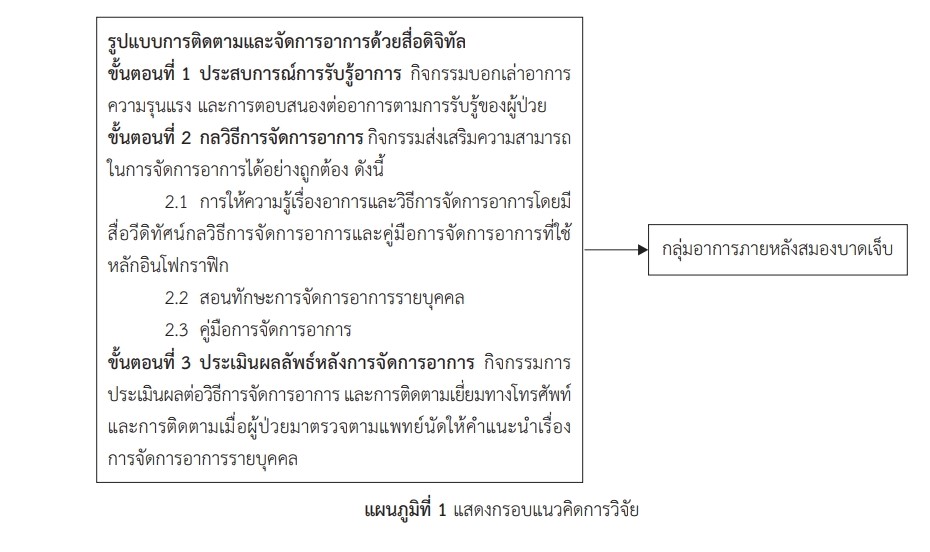ผลของรูปแบบการติดตามและจัดการอาการด้วยสื่อดิจิทัลต่อกลุ่มอาการภายหลังสมองบาดเจ็บในผู้ป่วยบาดเจ็บที่สมองระดับเล็กน้อย
คำสำคัญ:
การติดตามอาการ , การจัดการอาการ , สื่อดิจิทัล, กลุ่มอาการภายหลังสมองบาดเจ็บ, การบาดเจ็บที่สมองระดับเล็กน้อยบทคัดย่อ
การวิจัยกึ่งทดลองครั้งนี้ มีวัตถุประสงค์เพื่อศึกษาผลของรูปแบบการติดตามและจัดการอาการด้วยสื่อดิจิทัลต่อกลุ่มอาการภายหลังสมองบาดเจ็บในผู้ป่วยบาดเจ็บที่สมองระดับเล็กน้อย กลุ่มตัวอย่าง ได้แก่ ผู้ป่วยบาดเจ็บที่สมองระดับเล็กน้อยซึ่งมีคุณสมบัติตามเกณฑ์ที่กำหนด จำนวน 60 คน สุ่มอย่างง่ายเข้ากลุ่มทดลองและกลุ่มควบคุม กลุ่มละ 30 คน โดยกลุ่มทดลองได้รับการพยาบาลตามรูปแบบการติดตามและจัดการอาการด้วยสื่อดิจิทัล ส่วนกลุ่มควบคุมได้รับการพยาบาลตามปกติ เครื่องมือที่ใช้ในการทดลอง ประกอบด้วย รูปแบบการติดตามและจัดการอาการด้วยสื่อดิจิทัล วีดิทัศน์กลวิธีการจัดการอาการในรูปแบบการ์ตูนแอนนิเมชั่นใช้หลักการอินโฟกราฟิก และคู่มือการจัดการอาการใช้หลักอินโฟกราฟิก เครื่องมือที่ใช้ในการเก็บรวบรวมข้อมูล ประกอบด้วย แบบสอบถามข้อมูลทั่วไป และแบบสอบถามกลุ่มอาการภายหลังสมองบาดเจ็บ เก็บรวบรวมข้อมูลระหว่างเดือนกันยายน พ.ศ. 2563 ถึงเดือนมิถุนายน พ.ศ. 2564 วิเคราะห์ข้อมูลด้วยสถิติพรรณนา และสถิติทดสอบค่าที
ผลการวิจัยพบว่า ภายหลังการทดลอง กลุ่มทดลองมีกลุ่มอาการภายหลังสมองบาดเจ็บหลังจากได้รับรูปแบบการติดตามและจัดการอาการด้วยสื่อดิจิทัล น้อยกว่าก่อนทดลอง และน้อยกว่ากลุ่มควบคุมอย่างมีนัยสำคัญทางสถิติ (t = 10.145, p < .001; t = 5.845, p < .001 ตามลำดับ) จากผลการวิจัยครั้งนี้มีข้อเสนอแนะว่า รูปแบบการติดตามและจัดการอาการด้วยสื่อดิจิทัลสามารถช่วยลดกลุ่มอาการภายหลังสมองบาดเจ็บได้ พยาบาลควรจะใช้รูปแบบการติดตามและจัดการอาการด้วยสื่อดิจิทัลนี้เพื่อช่วยบรรเทากลุ่มอาการภายหลังสมองบาดเจ็บให้แก่ผู้ป่วยบาดเจ็บที่สมองระดับเล็กน้อยก่อนจำหน่ายออกจากโรงพยาบาล
เอกสารอ้างอิง
Aiadsuy, N., Kanbuala, W., & Junkul, S. (2020). The effect of a post-concussion symptoms management program on functional performance in patients with mild traumatic brain injury. The Journal of Faculty of Nursing Burapha University, 28(4), 58-73. [In Thai]
Akin, F. W., Murnane, O. D., Hall, C. D., & Riska, K. M. (2017). Vestibular consequences of mild traumatic brain injury and blast exposure: A review. Brain Injury, 31(9), 1188–1194.
Cnossen, M. C., Van der Naalt, J., Spikman, J. M., Nieboer, D., Yue, J. K., Winkler, E. A., … Lingsma, H. F. (2018). Prediction of persistent post-concussion symptoms after mild traumatic brain injury. Journal of Neurotrauma, 35(22), 2691–2698.
Dexheimer, J. W., Kurowski, B. G., Anders, S. H., McClanahan, N., Wade, S. L., & Babcock, L. (2017). Usability evaluation of the SMART application for youth with mTBI. International Journal of Medical Informatics, 97, 163-170.
Dodd, M., Janson, S., Facione, N., Faucett, J., Froelicher, E. S., Humphreys, J., … Taylor, D. (2001). Advancing the science of symptom management. Journal of Advanced Nursing, 33(5), 668–676.
Emeot, Y., Khuwatsamrit, K., & Chaivaiboontham, S. (2020). Effects of the self-care agency promoting program on knowledge, self-care ability perceived post-concussion symptoms, and recovery from brain injury in patients with mild traumatic brain injury. Nursing Journal of The Ministry of Public Health, 30(3), 207-222. [In Thai]
Ettenhofer, M. L., Guise, B., Brandler, B., Bittner, K., Gimbel, S. I., Cordero, E., … Chan, L. (2019). Neurocognitive driving rehabilitation in virtual environments (NeuroDRIVE): A pilot clinical trial for chronic traumatic brain injury. NeuroRehabilitation, 44(4), 531–544.
Faul, F., Erdfelder, E., Buchner, A., & Lang, A.-G. (2009). Statistical power analyses using G*Power 3.1: Tests for correlation and regression analyses. Behavior Research Methods, 41(4), 1149–1160. doi:10.3758/brm.41.4.1149
Hickey, J. V. (2014). The clinical practice of neurological and neurosurgical nursing (7thed). Philadelphia: Lippincott Williams & Wilkins.
Hiploylee, C., Dufort, P. A., Davis, H. S., Wennberg, R. A., Tartaglia, M. C., Mikulis, D., …Tator, C. H. (2017). Longitudinal study of post-concussion syndrome: Not everyone recovers. Journal of Neurotrauma, 34(8), 1511–1523.
King, N. S., Crawford, S., Wenden, F. J., Moss, N. E., & Wade, D. T. (1995). The rivermead post concussion symptoms questionnaire: A measure of symptoms commonly experienced after head injury and its reliability. Journal of Neurology, 242(9), 587–592.
King, N. S., & Kirwilliam, S. (2013). The nature of permanent post-concussion symptoms after mild traumatic brain injury. Brain Impair. 14, 235-242.
Kort-Butler, L. A. (2017). Head injury and substance use in young adults. Substance Use & Misuse, 52(8), 1019-1026.
Leddy, J. J., Baker, J. G., & Willer, B. (2016). Active rehabilitation of concussion and post-concussion syndrome. Physical Medicine and Rehabilitation Clinics of North America, 27(2), 437–454.
Lum, P., Harnirattisai, T., & Tantongtip, D. (2019). The effects of a continuing care program on the perceived self-efficacy of caregivers and post-concussion syndrome in persons with mild traumatic brain injury. Ramathibodi Nursing Journal, 25(1), 58-73. [In Thai]
National Center for Injury Prevention and Control. (2015). Report to congress on traumatic brain injury in the United States: Epidemiology and rehabilitation 2015. Retrieved from:https://www.cdc.gov/traumaticbraininjury/pdf/tbi_report_to_congress_epi_and_rehab-a.pdf
Nelson, L. D., Furger, R. E., Ranson, J., Tarima, S., Hammeke, T. A., & Randolph, C. (2018). Acute clinical predictors of symptom recovery in emergency department patients with uncomplicated mild traumatic brain injury or non-traumatic brain injuries. Journal of Neurotrauma, 35(2), 249-259.
Ponsford, J., Nguyen, S., Downing, M., Bosch, M., McKenzie, J. E., Turner, S., … Green, S. (2019). Factors associated with persistent post-concussion symptoms following mild traumatic brain injury in adults. Journal of Rehabilitation Medicine, 51(1), 32-39.
Prince, C., & Bruhns, M. E. (2017). Evaluation and treatment of mild traumatic brain injury: The role of neuropsychology. Brain Sciences, 7(8), 105.
Rooplor, S., Leethong-in, M., & Piyawattanapong, S. (2021). Effects of the self-efficacy enhancing program on the practice behavior of caregivers for the older patients with mild traumatic brain injury after discharge and post-concussion syndrome. Srinagarind Medical Journal, 36(5), 617-624. [In Thai]
Thaweekhoon, R., & Pearkao, C. (2019). Effects of a smartphone application on knowledge discharge outcome among patients with mild traumatic brain injury. Journal of The Royal Thai Army Nurses, 20(2), 272-279. [In Thai]
The Royal College of Neurological Surgeons of Thailand. (2019). Clinical practice guidelines for traumatic brain injury. Retrieved from: http://www.neurosurgerycmu.com/files/2019/12/GPG-final-2562-compressed.pdf [In Thai]
Van der Naalt, J., Timmerman, M. E., De Koning, M. E., Van der Horn, H. J., Scheenen, M. E., Jacobs, B., … Spikman, J. M. (2017). Early predictors of outcome after mild traumatic brain injury (UPFRONT): An observational cohort study. The Lancet Neurology, 16(7), 532–540.

ดาวน์โหลด
เผยแพร่แล้ว
รูปแบบการอ้างอิง
ฉบับ
ประเภทบทความ
สัญญาอนุญาต

อนุญาตภายใต้เงื่อนไข Creative Commons Attribution-NonCommercial-NoDerivatives 4.0 International License.




